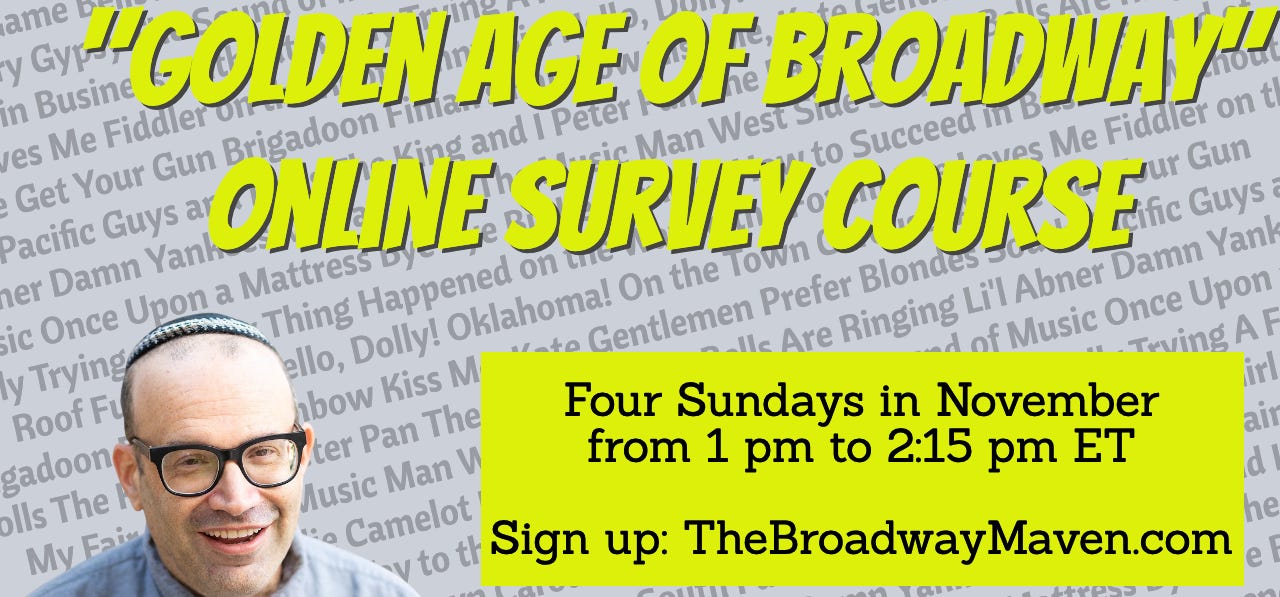Shalom, Broadway lovers!
Today’s monthly FREE Premium edition of the Broadway Maven’s Weekly Blast puts Sondheim under the microscope with Broadway Blasts about Sweeney Todd, Company, Assassins, Merrily We Roll Along, and Into the Woods. You’ll also find a Peter Filichia’s Broadway video on Carousel, a report on the recent phenomenon on sing-along Broadway performances, a video quiz about the lyrics to Fiddler on the Roof, a survey about future Sondheim revivals, and a LAST BLAST about Les Misérables.
JUST ANNOUNCED: Golden! The Broadway Maven is offering a four-week Survey Course on “The Golden Age of Broadway” every Sunday in November from 1 pm to 2:15 pm. Beginning November 5, Broadway Maven David Benkof and co-host/music educator Mateo Chavez Lewis will present more than 100 clips of songs from dozens of shows during that formative period in musical theater history. What are the characteristics of a Golden Age musical? Which one(s) do you want to see (or see again) next?
SONDHEIM UNDER THE MICROSCOPE: We kick off this month’s FREE Premium Weekly Blast with five Broadway Blasts about Sondheim’s works. Do you agree with my ideas? Your thoughts are welcome in the comments.
BROADWAY BLAST: In “By the Sea” from Stephen Sondheim’s Sweeney Todd, Mrs. Lovett sings to Sweeney, “We’ll have chums over every Friday.” A wordplay master like Sondheim could have chosen an alliterative alternative to “chums,” such as “friends” or “folks.” But he chose a word that refers to dead fish that live fish eat. It’s a cannibalistic metaphor, which is even more fitting given the cultural association between eating fish and Fridays.
BROADWAY BLAST: In “Ladies Who Lunch” from Company, Joanne mocks women who rush to their classes in “optical art.” That’s a term for images that appear three-dimensional from the outside, but are in fact flat — a good metaphor for “ladies” who overestimate their sophistication. But perhaps it also refers to the lead character and the show itself. Bobby, surrounded by an intricate web of relationships, nonetheless has a simple yearning for love and companionship. And on a meta level, “optical art” describes the nature of Company itself, an early “concept musical.” Underneath the illusion of being a normal book musical, shows like Company strip down the artifice to show subtle complexities that illustrate a core theme in new and refreshing ways.
BROADWAY BLAST: Did you notice this inside joke in Stephen Sondheim and Jerome Weidman’s Assassins? When failed Nixon assassin Sam Byck records an audio message to Leonard Bernstein, he jokes that if the composer doesn’t have time to read it today, perhaps he can read it “Tonight,” a reference to Bernstein’s famous tune from West Side Story. But he then misquotes the song, which is particularly funny because Bernstein didn’t write those lyrics; Sondheim did.
BROADWAY BLAST: In Stephen Sondheim and George Furth’s Merrily We Roll Along, the final scene (which is first chronologically in this reverse-time musical) has the show’s three main characters admiring the recently launched Soviet satellite Sputnik. That was not the universal attitude, since many Americans found Sputnik more threatening than inspiring. But what if the scene provides a metaphor that encapsulates the show’s themes? Reflection from the sun made the sphere-shaped Sputnik — launched in 1957 — look like a star, even though it was artificial underneath. It’s a neat metaphor for the life of Franklin Shepard, who by the last chronological scene (the first we see) is living an empty, sad life despite his popularity and fame. The metaphor resonates with the show’s exploration of the tension between authenticity and façade and even has echoes in the musical's structure, unfolding in reverse to peel away layers of artifice and reveal the characters' core values.
BROADWAY BLAST: Ever wonder why blindness is such a recurring metaphor in Into the Woods? In the Prologue, Cinderella ponders “What's the good of being good if everyone is blind?” As the plot unfolds, her sisters Lucinda and Florinda as well as Rapunzel’s prince become physically blind, although the prince’s sight is restored through his beloved’s tears. The emphasis on seeing fits the show’s plot, in which the blind pursuit of their desires leads characters like Jack and the Baker’s Wife to morally compromised situations.
PETER FILICHIA’S BROADWAY: Of Richard Rodgers’s 43 Broadway shows, which one was he most fond of? In this episode, Peter discusses Carousel, widely considered one of Broadway’s best, if not the best, musicals:
• why the show was Richard Rodgers's favorite;
• why "Soliloquy" is Peter's favorite Broadway song; and
• Billy Bigelow's character.
The author of The Book of Broadway Musical Debates, Disputes, and Disagreements, longtime critic and commentator Peter Filichia has seen more than 12,000 shows. He makes a video for every issue of The Weekly Blast.
(Note: this is the 300th video at the Broadway Maven’s YouTube Channel.)
REPORT: It’s OK, go ahead and sing.
Well, at least that was the message to the audience at a performance of Moulin Rouge! in August. The phenomenon will repeat itself at a performance of SIX next March, and if it’s successful, sing-alongs may be here to stay.
Of course, audience participation has long been a part of Broadway – from Peter Pan audience clapping (“I believe in fairies!”) to the rollicking dance-along finale of Mamma Mia!. Movie theaters have also organized sing-alongs of shows like The Sound of Music and Grease.
Now, though it’s normally completely unacceptable to sing during a show, rude or oblivious audience members still do. To be fair, I remember sympathizing (a little) with the people in the row behind me at Wicked who just couldn’t keep their mouths shut when the witches sang “For Good.” So the sing-along performance idea is perfect for certain audience members.
And if it helps increase ticket sales and awareness of the shows in question, it can only be good for the industry. As long as the artistic integrity is upheld and performers are undisturbed, this tuneful trend might just deserve a standing ovation.
VIDEO QUIZ: How well do you know your Fiddler on the Roof? This video challenges you to finish 10 lyrics from that classic show. Share your score in the comments below the video.
Note: links to register for ALL classes are always available at TheBroadwayMaven.com.
• Sunday, November 5 from 1 pm to 2:15 ET The Golden Age of Broadway survey course
• Tuesday, November 7: Gail Leondar-Wright on Sweeney Todd: The Demon Barber of Fleet Street (registration opens soon)
• Sunday, November 12 from 1 pm to 2:15 ET The Golden Age of Broadway survey course
• Tuesday, November 14: Mateo Chavez Lewis on the musical motifs of Sunday in the Park with George (registration opens soon)
• Sunday, November 19 from 1 pm to 2:15 ET The Golden Age of Broadway survey course
• Tuesday, November 21: Peter Filichia on Hello, Dolly! (registration opens soon)
• Sunday, November 26 from 1 pm to 2:15 ET The Golden Age of Broadway survey course
• Tuesday, November 28: David Armstrong on The King and I (registration opens soon)
LAST BLAST: The moral philosophy of each of the central rivals in Les Misérables is built around light. The bishop’s gift of candlesticks to Jean Valjean in the Prologue sets him on a path of kindness and forgiveness. Javert, by contrast, identifies with the stars, which he sees as rigid “sentinels” helping protect society.
Did you enjoy this monthly FREE Premium Weekly Blast? Get the weekly Premium version every Thursday in your inbox for just $5/month or $36/year.
Broadway Maven David Benkof helps students further their appreciation of musical theater through his classes, his YouTube channel, and his Weekly Blast. Contact him at DavidBenkof@gmail.com.









I’ve seen Hamilton three times, once each in LA, SF, and Chicago. Only in Chicago was I surprised as a huge part of the audience responded to King George’s “Every-bo-dy!” with the whole “da-da-da, dat-da, dat, da-da-da, da-ya-da...” bit. Oh, my heavens! I can’t tell you how satisfying that was!
Should audiences sing along? Here in the UK we have the panto tradition which encourages full participation from booing and hissing the villains to screaming at ghosts and singing along to every song. I am waiting for the Company sing along version and especially both Another Hundred People and then Not Getting Married Today which will separate the wheat from the chaff!